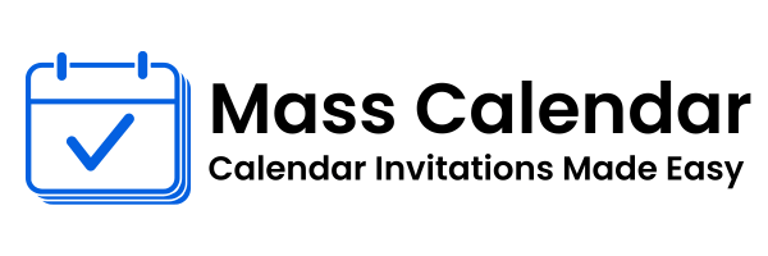Simplifying Mass Calendar Invites for Business Success
Organizing meetings is easy when you’re inviting a handful of people. But what happens when you need to include dozens, hundreds, or even thousands? That’s when learning how to send mass meeting invite or manage bulk calendar invites in O365 becomes essential. Large-scale scheduling helps businesses stay coordinated, minimize missed connections, and improve productivity.
BLOG
9/30/20252 min read


Organizing meetings is easy when you’re inviting a handful of people. But what happens when you need to include dozens, hundreds, or even thousands? That’s when learning how to send mass meeting invite or manage bulk calendar invites in O365 becomes essential. Large-scale scheduling helps businesses stay coordinated, minimize missed connections, and improve productivity.
This blog takes a closer look at how organizations can simplify bulk invitations across Gmail, Outlook, and Google Calendar, while highlighting practical tips for professional event coordination.
Calendar Invites: The Backbone of Scheduling
At its core, a calendar invite is a digital tool designed to streamline scheduling. Unlike simple emails, invites sync directly to attendees’ calendars, providing real-time updates if times or details change. This makes them indispensable for corporate teams, educators, and event organizers.
Why Use Bulk Calendar Invites?
The need for bulk scheduling often arises in:
Corporate Meetings: Internal announcements or leadership town halls.
Webinars: Inviting hundreds of external participants.
Training Programs: Managing attendance across multiple departments.
Sending each invite manually isn’t practical. Bulk scheduling ensures accuracy and efficiency.
Gmail and Mass Invites
With Google Calendar integrated into Gmail, it’s straightforward to send mass meeting invite in Gmail. Simply create an event, add multiple participants, and use group contacts to manage large lists. This approach also works well if you need to send bulk meeting invite in Gmail for webinars or team sessions.
Outlook and O365 for Professionals
Microsoft’s Outlook offers advanced scheduling tools. To send a mass calendar invite in Outlook, you can:
Use distribution lists.
Create recurring events.
Share links directly within the invite.
In enterprise settings, bulk calendar invites in O365 make it easy to distribute meeting information across departments or global teams.
Google Calendar for Groups
For teams already using Google Workspace, bulk calendar invites in Google are seamless. By creating group emails, organizers can send invites to large audiences in just a few clicks.
Tips for Efficient Bulk Scheduling
Check Time Zones: Prevent confusion in global teams.
Use Clear Titles: Event names should reflect purpose.
Include All Details: Links, agendas, and attachments.
Respect Privacy: Hide attendee lists when necessary.
Leverage Reminders: Automated alerts boost attendance.
Common Pitfalls to Avoid
Forgetting to attach relevant files.
Overloading attendees with unnecessary sessions.
Not verifying recipient lists before sending.
By keeping these in mind, organizers can avoid common scheduling mistakes.
Conclusion
From Gmail to Outlook and Office 365, the ability to manage calendar invites at scale has become a core professional skill. Knowing how to send mass calendar invite in Outlook or use group IDs in Google ensures smooth, efficient coordination. Whether you’re scheduling a small workshop or a company-wide event, mastering bulk scheduling leads to better attendance, clearer communication, and stronger productivity outcomes.
MassCalendar.in
Send Bulk & Mass Calendar Invites Instantly
CONTACT
Meetings
+44 (0) 203 916 5117
© 2025. All rights reserved.
Help?
